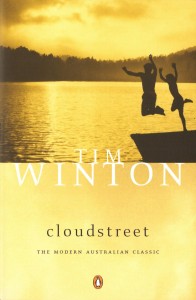Cloudstreet (1991) by Tim Winton.
Exhilarating, depressing, amusing, frightening, confusing, boring, exciting, just like life. Recommended for adults. If you liked Iron Man III, do not read this novel.
The novel is a ramshackle chronicle of two families, the Pickleses and the Lambs. By twists and turns they come to share a house owned by the luckless and penniless Sam Pickles. Over more than twenty years at 1 Cloud Street the two clans together become a tribe through many trials and tribulations. Sam supports the bookies and his sodden wife Dolly likes men with pants. Their daughter, Rose, the oldest of three children, hates her mother a little more than her father (a deliberate ambiguity). Brothers Ted and Chub are, be it said, no more than ciphers. Oriel Lamb has the drive of a sergeant-major and her husband Lester was trained by the army in two wars to obey. Their children are Quick, Fish, Lon, Hat, Elaine, and Red. The first three are boys and the last girls, these being family nicknames.

From 1945 to 1965 they bounce off each other, spin out of control, try out the temptations of Perth, hate and love one another, punctuated by long periods of mutual indifference.
The Monster of Nedlands appears to remind us all how vulnerable the gravity is that holds us to this life. He also figures in Robert Drewe’s Shark Net (2000). There is a pig who seems a relative of the one in In the Winter Dark by Winton.
The Lambs are noisy Baptists and the Pickleses are … Nothing much. But Sam Pickles needs the rent and Lester Lamb needs the roof so they accommodate each other. Over the years an elastic modus vivendi keeps them in orbit around each other.
Sam waits for his luck to change while doing as little as possible, apart from blaming everyone else for making him a victim. Oriel does too much, too often, and makes her own luck with the loyal Lester at her side, when he is not in the kitchen turning our pastries and pies for the shop. That is the overarching theme, these two attitudes to life: the fatalism of luck or the energy of work.
The story line is the gradual convergence of Rose and Quick. Oops, that is a spoiler. He is called Quick in the way a giant is called Tiny. Rose reads books, including novels like Jane Eyre. Moreover, she is diabolically smart though needs must and she leaves school at the legal age of 16.
I did not know what to make of Quick’s wall of misery, newspaper cuttings of loss and destruction he cut out and stuck on the wall in his room when he was 14 or so. Still less did I know what to make of Quick’s guardian angel, the aboriginal, who several times advises him, and appears at least once to another. More importantly, I did not know what to make of the house-mysticism in the book. It is often implied that the house itself has character or an aura but it is not manifested in the prose.
Some things are elided to concentrate on the story, like the paper work associated with running a small business.
I have read a couple of Winton’s books before and liked them, e.g., In the Winter Dark and The Riders.
One of the blurb writers on the back cover says it is a working class novel. Well that is Sam Pickles but not the shop keeping Lambs, surely. As usual the bourgeoisie does not understand what working class means, never having done it themselves. It does not mean owning and running a shop (Lamb), or living off the rental of property (Pickles).
I read this in anticipation of going to a conference in Perth in September. I have several more Perth titles in readiness.
Read it in Darwin, August 2013.
Skip to content
